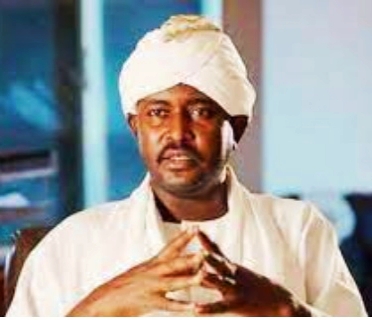A Close-Up of the “Nairobi Farce”

By Al-Sadiq Al-Razziqi
All those faces that climbed the frail stalks of foolishness today in Nairobi came to write the death certificate of a wretched project—one with despicable features, a pale face, and a brazen forehead, its most prominent trait being the yellow hue of death. They gathered for it the politically rusted, the discarded remnants of rejected parties, bandits, and wanderers on the slimy path of politics, laden with its mud, filth, and blood.
These were faces stained with disgrace, their nails extending like daggers, their hooves meeting blades in treachery. They arrived with their eyes, fingers, and palms still dripping with the blood of women, children, men, and elders from our homeland—victims of their cursed war. Did you not see them glancing around in that mute hall, trembling with fear and anxiety? The spirits of the innocent victims and martyrs from El Fasher, El Gutaina, Wad Al-Noura, and the Zamzam camp haunt them, chasing them, tightening blood-woven nooses around their necks, as they sink deeper into the pit of treachery. Meanwhile, the hooves of our heroic army’s victories trample over their trembling faces every morning and evening on the battlefields.
They flocked to Nairobi like a congregation of weak birds, their hearts nearly leaping from their chests as they feigned deceptive, vile smiles. In that ornately decorated hall, they felt the emptiness within them—trapped inside a gilded iron cage, encircled by the militia’s wealth and its sharpened spears. They sat like chattering parrots, staring at the ceiling, adorned with the patterns of their defeat, and chanting hymns of flattery and servitude to the militia leaders, while the stench of betrayal clung to their noses and lips.
We saw Al-Hilu… carrying his eternal disgrace, entering the hall like a man bitten by a snake. He took the price but not the homeland. His lost gaze wandered between his victims, his defeats, and his shattered dreams since his first rebellion and his alignment with Garang. He achieved nothing and spent his life as a defeated insurgent, hiding among rocky caves like a bat. Yesterday, he leaned on the dry crutch of the militia, groveling before bloodsuckers, seeking a glory he never built and never will. He deluded himself into thinking he would find it in that wasteland, only to be swallowed whole by the insatiable serpent.
A filthy handful of political dirt arrived—outcasts expelled from their parties and movements. Al-Fadil Allah Burma Nasir came only to taint the garments he once wore with honor—the uniform of a soldier and the robe of the Umma Party, which forged Sudan’s independence in 1956. He cast both aside and threw himself into the unholy fire of the militia like a blind moth, burning both history and himself.
Former rebel leaders Al-Hadi Idris, Al-Tahir Hajar, and Suleiman Sandal chose to walk behind the funeral of a slain nation. They carried their defeats, their illicit ambitions, and their corrupt souls, binding their hands and necks with a rope soaked in humiliation. Barking like stray dogs behind the militia’s convoy, their faces were covered with layers of dust, coughing and choking on the bitterness of their impotence and greed, while their own people were being killed and slaughtered. What a despicable act of betrayal!
As for the scion of the Al-Mirghani family, he accepted the militia’s saddle upon his back, with a bridle in his mouth like a camel. They adorned him with glittering deception, but little did they know he was already a diseased beast, abandoned by his party and kin. He earned the title of a pathetic fool, willingly reducing himself to a mere tail—just another pawn in the sordid game of politics.
Some tribal figures, though few, were mere ornaments, placed there to beautify the scene. Their faded robes matched their hollow stances, like the brittle shells of deceit. Their eyes gleamed with confusion as their weak, wavering positions crumbled before them. They betrayed a homeland that gave them everything, selling out for money, with nothing to save them from drowning in the militia’s turbulent, acidic swamp. The people saw them yesterday—faces devoid of any dignity.
But the honorable leaders of Sudan’s native administrations and noble tribes rejected the militia’s invitations, turned their backs on the UAE’s handouts, and preserved their legacy, history, and name, refusing to let them be tainted. They declined and boycotted, while those who went to Nairobi drifted away with the wind.
As for the political dregs and activists, most of them were unknown—mere zeros in the equation of public affairs. Faces no one had seen before, rabble gathered to fill the room, aligning like cobblestones on the pavement. They reveled in the wretched carnival, shouting as if aboard a lost ship, their throats dry from their damned chants, their eyes void of vision or direction. They wandered the desert of confusion, worshiping the Emirati golden calf.
As for Al-Nur Hamad, Nasr al-Din Abdul Bari, and Mohamed Hassan al-Tayashi, along with the rest of the activists, they are of no concern—they emerge from the defeated carcass of rebellion, born of nothingness and returning to nothingness. Beating a dead horse is forbidden.
And finally…
All who attended dreamed of a grand spectacle draped in robes stitched with golden threads. But instead, they and their celebration stood bare, stripped of all value. In a few days, they will each return to their place—some back to their barking posts, others to the garbage heaps from which they came, brushing flies off their faces. The mercenaries will refine their craft of begging, and those who wait shall wait in vain. For the militia’s pockets are empty.



